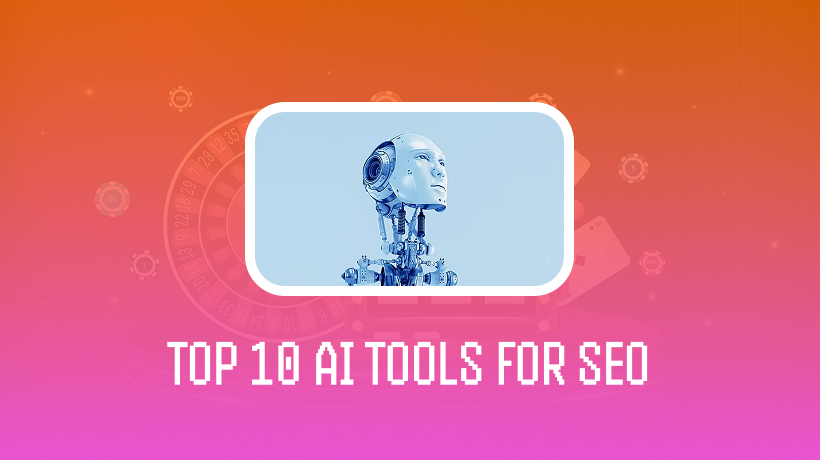Beyond Keywords: How AI is Reshaping Your Google Game
But then, Artificial Intelligence (AI) zoomed onto the scene, transforming SEO from a predictable map into a dynamic, intelligent system. If you’ve ever felt overwhelmed trying to keep up with Google’s ever-changing rules, you’re not alone.
The good news? AI isn’t just for big tech companies anymore. It has become a powerful ally that’s making SEO smarter, faster, and more effective for everyone.
This isn’t about replacing human smarts with robots. Think of AI as a superpower for your existing SEO efforts. It’s like having a super-fast analyst, a content wizard, and a market spy all rolled into one, helping you understand what your audience truly wants, how competitors are winning, and how to get your own voice heard above the noise.
The AI Advantage: Why Your SEO Needs a Robot Boost Today
Remember when SEO was simpler? Stuffing keywords, building questionable links, those days are long gone. Today’s search engines, especially Google, are incredibly sophisticated.
They prioritize quality, user experience, and genuine value. This means SEO has become more complex, requiring deep insights into user intent, massive data analysis, and constant adaptation to algorithm updates.
The traditional approach to SEO struggles to keep pace with the explosion of online data, intelligent algorithms that understand context, and user expectations for personalized, relevant answers delivered instantly. Enter AI, not as a replacement for human intellect, but as an indispensable partner that excels where humans struggle.
Key Benefits of AI in SEO:
| Benefit | Description | Impact on SEO |
| Efficiency & Automation | AI automates time-consuming tasks like data entry, report generation, and initial content drafts | Frees up marketers for strategic thinking; allows faster campaign testing |
| Enhanced Data Analysis | AI processes massive datasets, identifying patterns humans might miss | More precise keyword research, better content optimization, accurate user intent predictions |
| Content Scalability | AI generates various content forms and adapts across languages and platforms | Boosts content production; expands reach to diverse audiences rapidly |
| Hyper-Personalization | AI gathers user data to personalize ads and on-site experiences | Increases engagement and conversion rates; aligns content with individual interests |
| Competitive Advantage | Businesses using AI respond faster to market changes and optimize more effectively | Enables proactive SEO strategies; identifies emerging trends and competitor weaknesses |
AI allows you to move beyond simply reacting to algorithm changes, empowering you to proactively anticipate user needs and deliver outstanding experiences.
Your AI Arsenal: The Top 10 Tools Revolutionizing SEO
The landscape of AI tools for SEO is constantly expanding. Here are ten key types of AI tools fundamentally reshaping how SEO is done:
1. AI-Powered Content Generation & Optimization Tools
These tools use machine learning to produce written content, headlines, and video scripts, significantly speeding up production while optimizing for search engines. AI algorithms analyze high-ranking content to understand structure, tone, and keyword usage, then generate text that’s both engaging and optimized.
They produce large volumes quickly, automate routine writing, ensure content includes relevant keywords following best practices, and generate content in multiple languages.
2. AI-Powered Keyword Research & Gap Analysis Tools
AI takes keyword research beyond basic lists by uncovering hidden opportunities, predicting trends, and analyzing competitor strategies.
These tools process massive search data to identify emerging topics, long-tail keywords with high conversion potential, and semantic relationships. They perform “gap analysis,” showing keywords competitors rank for that you don’t, helping you understand the intent behind user searches.
3. AI for Technical SEO Audits & Optimization
AI crawlers analyze websites for hundreds of technical issues hindering search engine performance, site speed, mobile-friendliness, broken links, duplicate content, schema markup, and crawlability. They quickly identify technical errors, monitor site health continuously, improve user experience, and ensure search engine bots can easily access and index content.
4. AI-Driven Personalization & User Experience Tools
Tools like Optimove and Act-On Software gather extensive data on user behavior and demographics, then use AI to dynamically adjust content, recommendations, and ad placements, creating unique journeys for each visitor. This increases engagement, boosts conversion rates, reduces bounce rates, and signals to Google that your site provides value.
5. AI for Competitor Analysis & Market Intelligence
Platforms like PartnerMatrix use AI to monitor competitor websites, backlink profiles, content strategies, and affiliate networks. They identify newly launched campaigns, keyword targeting changes, and brand presence across sites, helping you quickly identify strengths and weaknesses, spot opportunities, and understand competitive landscape shifts.
6. AI for Sentiment Analysis
Tools like First Look use Natural Language Processing to analyze text from reviews, social media, and forums, identifying emotional tone and extracting key topics. This helps refine content strategy, manage brand reputation, uncover emotional drivers behind queries, and integrate real user feelings into development.
7. AI-Powered Link Building Assistants
These tools analyze millions of websites, identifying potential link partners based on relevance, domain authority, and existing profiles. They assess backlink quality and value, sometimes automating outreach. This drastically reduces manual prospecting effort, focuses on acquiring high-quality links, facilitates larger-scale sourcing, and identifies potentially spammy opportunities to avoid.
8. Predictive SEO Analytics & Forecasting Tools
Tools that use machine learning models to analyze historical data of rankings, traffic, algorithm updates, and competitor moves. They identify patterns to predict future performance, forecast traffic changes, and anticipate algorithm shifts, enabling proactive strategy, budget optimization, risk management, and competitive foresight.
9. AI for Local SEO Optimization
They analyze local search behavior, citations, reviews, and Google Business Profile listings. They identify GMB optimization opportunities, suggest localized keywords, monitor local competitors, and help manage review responses at scale, increasing local visibility and enhancing customer engagement.
10. AI-Powered Rank Tracking & Performance Monitoring
These tools continuously monitor rankings and integrate with analytics to correlate changes with traffic, conversions, and revenue. AI identifies complex factors influencing rank changes, alerts you to significant shifts, and suggests optimization actions, providing actionable insights and early warnings for quick intervention.
The Human Touch: Why Your Brain Still Trumps the Bots
Even with incredible AI tools, humans remain at the heart of truly effective SEO. AI is a powerful assistant, but not a replacement for human creativity, strategic thinking, and ethical discernment.
The Irreplaceable Role of Human Expertise
AI can analyze data and generate content, but it can’t genuinely understand human emotion, cultural nuances, or implicit user intent. A human SEO specialist infers the deeper why behind search queries. True innovation and storytelling that captivates audiences still demands a human mind. Ethical decision-making, ensuring content isn’t misleading and navigating data privacy concerns, requires human judgment.
Strategy and Oversight
AI tells you what is happening, but human strategists decide what to do about it. Setting SEO goals, integrating with business objectives, and adapting to market shifts requires human oversight. When an algorithm update penalizes certain content, humans understand why Google made that change and what strategic pivot is required.
While AI drafts content, human editors ensure it aligns with brand voice and offers genuine value. Google increasingly rewards high-quality, helpful content, making human review crucial.
Beyond Today: The Future of AI in SEO
The integration of AI into SEO will continue evolving rapidly. Key trends will shape how we approach optimization:
Human-AI Collaboration: AI will evolve from executing tasks to offering strategic insights, learning from feedback and adapting to your brand. Tools will integrate more seamlessly into existing platforms, democratizing SEO for non-experts.
Brand Building and E-E-A-T: Google’s emphasis on Experience, Expertise, Authoritativeness, and Trustworthiness means genuine brand building becomes critical. AI assists in identifying content gaps, researching topics, and monitoring reputation, but as Google penalizes low-quality AI content, the focus shifts to producing genuinely valuable content with human oversight.
New Search Interfaces: AI powers voice assistants, making voice search optimization crucial. Visual search will become more prominent. AI personalizes search results based on user history, emphasizing relevant content for specific segments.
Ethical AI: Mass data processing raises privacy concerns. Stricter regulations like GDPR will evolve, requiring vigilance about how AI tools handle data. Addressing biases and demanding transparency in AI decision-making will become critical.
The future of SEO is one of constant learning and adaptation. Those who embrace AI as an integral partner in holistic strategy, committing to continuous learning, ethical implementation, and strategic collaboration, will truly revolutionize their search rankings and genuinely connect with their audiences.
Conclusion
AI transforms SEO through ten key tool categories: content generation, keyword research, technical audits, personalization, competitor analysis, sentiment analysis, link building, predictive analytics, local SEO, and performance monitoring.
Success requires balancing AI capabilities with human oversight, creativity, and ethical judgment. Google’s emphasis on helpful content means AI must enhance genuine value. The future combines AI’s processing power with human strategic thinking to build authoritative brands serving audiences effectively.





